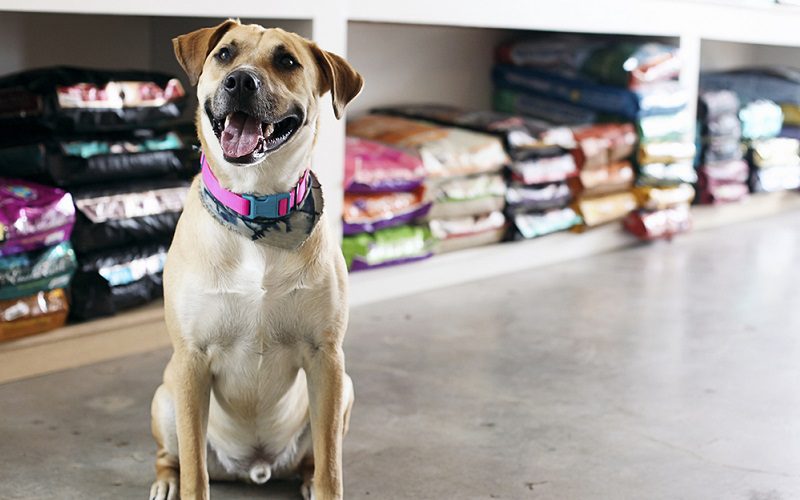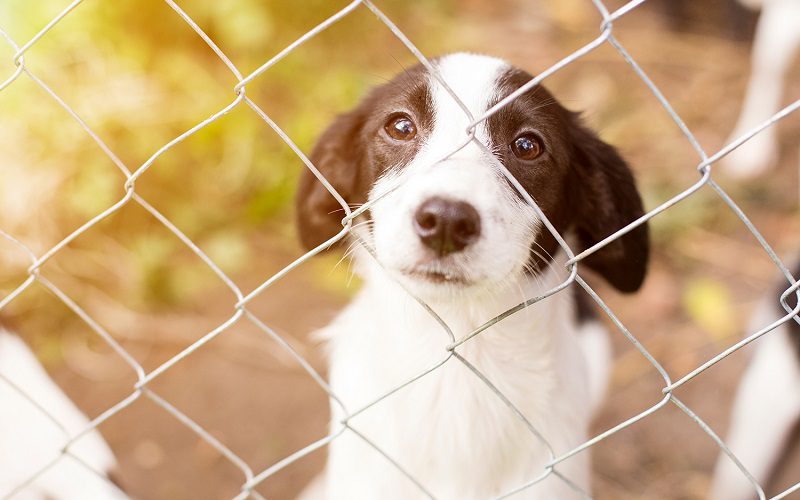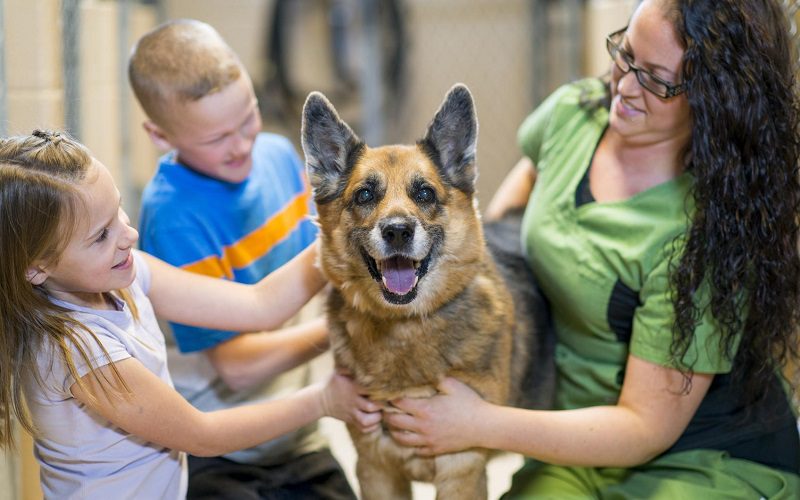Last Updated: 9 months ago
Whether a first time or a veteran dog owner, the choice between adopting a dog from a shelter and buying one from a breeder can be tough.
Whatever the pros and cons to either option, the most important thing is choosing a dog that fits with your family.
In this article we’ll talk about the differences between adopting a rescue and buying a dog from a breeder.
We’ll include the pros and cons of each but in the end, we will show you why it’s so much better for you, for the dog, and for society to adopt a loving, deserving dog from a shelter.
Pet Shops, Breeders, And Puppy Mills

There is no shortage of shops and breeders trying to make a profit off of your good intentions. You want a loving, reliable, and adorable new member of the family. There’s nothing wrong with that.
But not all breeders are equal. Some run a solid, ethical business but others rely on “puppy mills”, treat their dogs inhumanely, and the dogs they don’t always come as advertised. There are a lot of issues with this option that many future pet owners don’t really know about.
There are some advantages to going with a breeder if you are able to find a reputable breeder. Here are a few:
Pros of Going to a Breeder
- Specific, verified purebreds: if you absolutely need a specific breed of dog and you need that dog to be certified as a purebred, a reputable breeder can give you that. It’s far less likely that a shelter will have purebreds and if they do, they almost certainly won’t have the certifications to prove it is purebred.
- Get a puppy as young as possible. If you need to train your dog to do specific tricks or tasks, you want to do it as early as possible (as soon as it’s been weaned). You can find young puppies at the shelter, but it is easier with a breeder who knows exactly when a litter is born and when they are ready to be taken home.
- Professional competitions: if you plan to enter dog competitions, whether it’s a conformation show, obedience trial, or even a sheepdog trial, you will need a purebred and you will need to train it from the ground up. In this case, a breeder is your only option but you still need to shop around and look for a reliable breeder.
- Breeder advice: if you go with a good breeder, they will offer to stay in contact and help you as you raise your dog. They will have a good record of its family history and be able to provide a lot of information that a vet will find helpful.
Cons of Going to a Breeder
While some of those advantages can sound nice, they come at a high cost. Here are a few of the biggest disadvantages of buying a dog from a breeder:
- Reputable and honest breeders are rare. There are lots of people out there who either start breeding without knowing what really goes into it and end up doing badly or those who deliberately use cruel, unethical or deceitful methods to breed dogs. This is an important issue and we will go into it more a little later.
- Training puppies is hard. If you’ve never had a true puppy before (like you will get from a breeder), you might not be aware of just how hard it actually is to train them. Like children, they have short attention spans and minimal control over their urges and energy. Unlike children, they have no language skills so you can’t try to reason with them. Plus, when you get a puppy from a breeder, you usually need to train EVERYTHING (including potty training, not chewing all your things to bits, and so on).
- It’s really expensive. At a minimum, expect to spend $500. But a price closer to $1,000 to $1,500 is very common. It depends on the breed but no matter what breed, it is much more expensive than adoption.
- Extra puppy costs: even a reputable breeder often does not take care of vaccinations, spaying or neutering because when you buy the puppy, it is simply still too young. So that means, on top of the price of buying the puppy, you also have to pay for all the vaccinations and the spaying or neutering.
- Purebreds aren’t as healthy. Purebreds get to be “pure” because of generation after generation of mating close relatives together. This results in a “pure” breed of dog but it also puts it at risk for more health problems. Your vet bills will be more expensive.
Behind the Scenes at a Puppy Mill
The simple fact is that even the most responsible and well-intentioned breeders are still not a great choice. Dogs are well overpopulated and many end up in shelters which, to stop overcrowding, are forced to euthanize most of them.
One big factor in this problem is puppy mills. These are places where dogs are bred for profit and the owners have no regard for the wellbeing of the dogs. They are born and kept in cramped, dirty conditions.
They are taken away from their mothers too early and not properly socialized with other dogs or with humans. They have rarely had adequate veterinary care and they are at much higher risk for disease and illness.
The mothers are forced to deliver one litter after the other without rest all while being kept in cramped cages.
Dogs from puppy mills most often end up in pet stores or being sold online. So avoid both of these options and buy direct from a breeder who you have met and whose facilities you have toured.
In short, puppy mills are terrible, tragic places where dogs are born and kept in awful, inhumane conditions.
Tips for Finding a Good Breeder
If you still insist on going with a breeder, here are some tips for making sure you choose the most responsible and honest breeder in your area:
- Make a list. Don’t just read these tips and hope you remember all of them as you meet with different breeders. Make a list of the questions you need to ask and the qualities you need to look for.
- Know that “USDA licensed/inspected” means little. The USDA only checks that a bare minimum of dog food, water, and shelter is available. They don’t require plenty of open space and exercise, or plenty of socialization and rest between births. In short, they don’t regulate how the dog is raised or cared for. So simply being approved by the USDA is not enough to prove the breeder is responsible.
- Ask to see all parts of their operation. A responsible breeder will usually offer to do this. The places where the dogs and puppies are kept should be clean and spacious so the dogs can run around freely and play.
- Examine the dogs. Dogs and puppies should look clean, healthy, and energetic. If the dogs don’t look happy and healthy, chances are that they aren’t.
- Find out how many breeds they sell. A good breeder specializes in just a few breeds (preferably just one or two). And they have extensive knowledge about every breed they sell. Ask lots and lots of questions about the breed. Take notes. And verify the information.
- Ask for veterinary records. A responsible breeder has close relationships with one or more vet in the area. They also keep thorough records of every visit and will show you upon request.
- Ask about genetic risks and health problems. They should be upfront and honest. Every purebred (I repeat, EVERY purebred) has its own special risks. A good breeder knows these risks. And they usually make a point to tell you even if you don’t ask because they want to make sure you have the information needed to take good care of the dog.
- Never buy a dog on the Internet. No breeder that sells dogs on the Internet is a responsible breeder. There is NO exception to this rule. A responsible breeder will not sell a puppy to a person they haven’t met in person. And if you buy on the Internet, you have no way of checking the facilities.
- If the breeder requires you to go to a specific vet, stay away. They can recommend vets they know in your area but if they say you have to go to the one of their choosing, they are hiding something from you.
If you notice suspicious signs while you check breeders, you should report this to the authorities. Do your part to put a stop to unsafe and unethical breeding.
In addition to these tips, pay attention to how the breeder treats you. Do they want you to visit multiple times? Do they want the whole family to meet the dog before you bring it home? Do they ask a lot of questions about your experience with pets and your reasons for getting a dog?
If they show a lot of concern about your ability to care for the dog before they sell it to you, this is a good sign that they are a responsible and honest breeder.
Adopting A Shelter Dog

Now that we have adequately discussed why breeders are not ideal and, if you still want a breeder, how to choose them well, it’s time to look at your second (and far better) option—rescue shelters.
In the following section, we’ll look at the many pros of adopting a dog. Then in the second section, we’ll talk about some of the challenges that come with choosing the adoption route:
Adopting A Rescue Dog
The Advantages of Adopting a Rescue Dog
Here are some of our favorite benefits of adopting a dog from a shelter:
- You’ll save a life. Nearly 3 million dogs and cats are euthanized every year because they weren’t adopted. Each pet that is adopted is a pet that escaped that fate. More than that, you’ll be giving that dog a chance at a great, happy life with a loving family.
- Great options: most animals at shelters are happy, healthy, and well socialized. They are at a shelter because of human problems (moving, divorce, allergies, etc.), not because they did anything wrong.
- At many shelters, the cost of adoption includes the cost of vaccinations, spaying or neutering, and even microchipping. Plus, you are paying just double digits instead of triple or quadruple digits.
- Combat puppy mills: ever pet adopted from a shelter is one less pet bought from an inhumane breeding factory. We’re not criticizing reputable breeders (although we still choose adopting to cut down on overpopulation) but the tragedies at non-reputable breeders are well worth fighting against.
- Less training: rescue pets are often already house-trained. No need to spend all that time scrubbing out messes from the carpets and bedding. And no chewed up shoes or scratched furniture.
- Good for self-esteem: each time that you look into your dog’s eyes and know that you saved its life, you made an important and positive impact on their life, you’ll feel better. Trust us. And the devotion you’ll get from a dog that knows what life is like without a loving family is unbeatable.
- Unique: if you get a purebred, it pretty much looks like all the other purebreds in its species. If you get a mixed breed, you get a unique blend of many different, great qualities. The perfect dog for you is waiting at a shelter.
- Less health problems: we are definitely not saying no health problems. But mixed breeds are far less prone to genetically inherited illness like purebreds. They also tend to live longer. So you get more happy moments with your pet.
The Challenges of Adopting a Rescue Dog
With all those positives in mind, there are some downsides worth considering. However, we definitely feel the benefits far outweigh these draw backs.
They don’t come with a history. If their parents were prone to certain illnesses, you won’t know in advance. If they were vaccinated or not, you won’t know. If they had negative experiences, you won’t know (except from their behavior).
However, this isn’t that difficult to overcome. You can get them vaccinated easily. You can ask the shelter what they know about its previous family. And you can bring children to the shelter before bringing the dog home to make sure it gets along with everyone in the family.
Finally, if you are really concerned about knowing its genetic history to see what illnesses to be on the lookout for, you can get a DNA test done for your dog—that’s even more accurate than just knowing its family history.
Shelter dogs are often older. Many people are hesitant about buying adult dogs. You won’t have as many years with them as you would if you got a puppy. And it’s hard to lose someone you love.
But you can find younger dogs at shelters although they tend to get adopted faster.
Moreover, adult dogs are not a bad thing. Even though you won’t have them as long as if you got a puppy, just consider what you are doing. That dog had few chances of being adopted into a loving family and you gave it that chance.
It might only feel like a few years for you, but for the dog, those are going to be the best years of its life—years it never would have been able to live without you.
Plus, adult dogs are already well trained! Just bring them home and they know what to do!
A Final World On The Issue Of Adoption Vs Breeders

It’s pretty clear what our stance is here. Adoption is the better option. Not only are you saving the life of a dog who might have had to be euthanized but you are getting a lot of other benefits as well.
Mixed breeds have far fewer health risks. Shelters often spay or neuter for you (or do it for very cheap). You don’t have to do as much training in most cases. The benefits are just endless.
So unless you are planning to make a career out of dog shows, there is almost no valid reason to buy a purebred. But if you do choose to go that route, make sure you avoid puppy mills like the plague and report any breeder that you find suspicious.
Resources:



